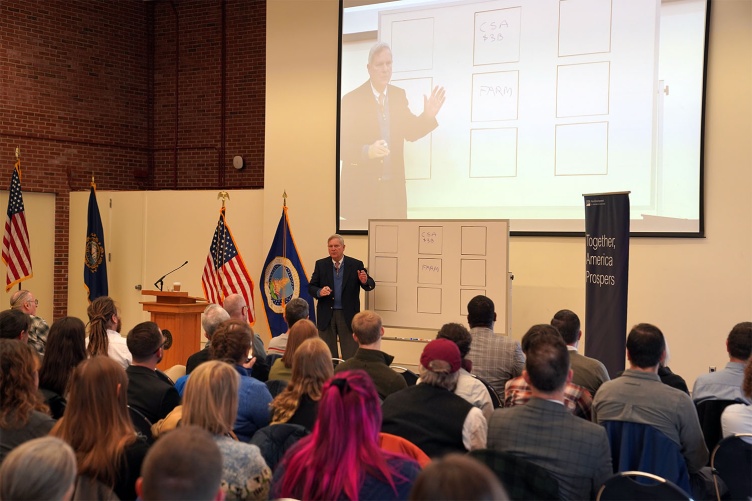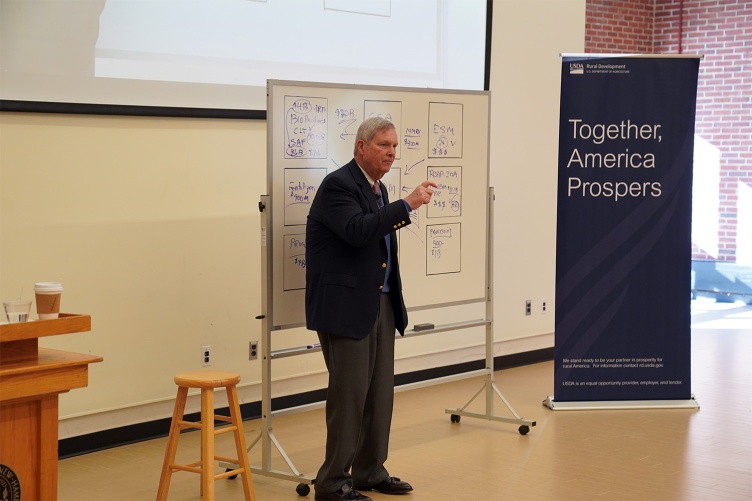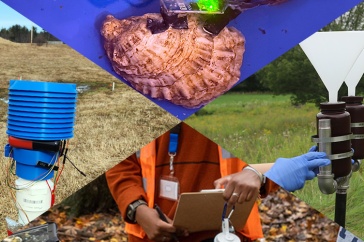U.S. Secretary of Agriculture Tom Vilsack held a town hall in Durham on January 8, during which he spoke to an audience of more than 100 University of New Hampshire faculty, staff, and students as well as agricultural producers, leaders at non-profit organizations, and state and federal agency officials from across the state and region. The Secretary emphasized the importance of the country’s small and medium-sized farms—which dominate New England’s agricultural landscape—as well as the well-being and resiliency of rural communities.
Sec. Vilsack highlighted the increasing consolidation of farm operations in the U.S. and how just 7.5 percent of the country’s approximately 2 million farms make 89 percent of the farming income—while the other 92.5 percent share the remainder. He also noted the loss of 141 million acres (about the size of Texas) of U.S. farmland over the past several decades, and the loss of more than 437,000 farms since 1981, asking the crowd: “Are we ok with that?”
The Secretary also brought attention to the continuing need to bring reliable, high-quality healthcare to rural communities, which are critical to ensuring the success of food producers and whose residents are key stewards of large areas of lands and ecosystems. The lack of consistent healthcare services limits rural communities’ access to both the types of medical support and the availability of health professionals.
It was a message that resonated with many in the room, particularly researchers at the UNH College of Life Sciences and Agriculture and the College of Health and Human Services. These scientists and their colleagues study agricultural systems and healthcare access in northern New England and develop innovations that enable the Granite State’s more than 4,000 farms to be more profitable and sustainable, consumers to enjoy greater availability of healthier foods, and every resident to obtain timely medical care.
“It was particularly gratifying to look around the room and see the many people at UNH who are actively contributing to the discoveries, innovation and education that help overcome the challenges encountered by our state’s farming and rural communities,” said Anton Bekkerman, director of the New Hampshire Agricultural Experiment Station. “From developing shared marketing and alternative food systems, to better understanding how technology can help measure nitrogen levels in our waters, how crop management can improve soil quality and reduce losses from droughts, and how locally produced foods can reduce chronic diseases—the locally inspired research and innovation is at the core of how our land-grant university supports New Hampshire.”
“I want to thank Secretary Vilsack for taking the time to visit and learn about UNH’s role in addressing New Hampshire’s needs, including health, access to health care, telemedicine, creation of jobs and economic opportunities in rural and underserved communities,” said Kirsten Corazzini, Dean of the College of Health and Human Services. “In New Hampshire’s rural communities, the health systems are almost always the largest employer and are engines of the local economies. When they are at risk, the whole community is at risk.”
The town hall event helped emphasize the importance of UNH continuing to play a lead role to develop science and education and to partner with community and government organizations for supporting the economic, physical, and mental well-being of the people who sustain regional food systems and help steward the state’s diverse lands and landscapes.
You can learn more about the mission and committments of the New Agricultural Experiment Station online.
-
Written By:
Nicholas Gosling '06 | COLSA/NH Agricultural Experiment Station | nicholas.gosling@unh.edu




















































